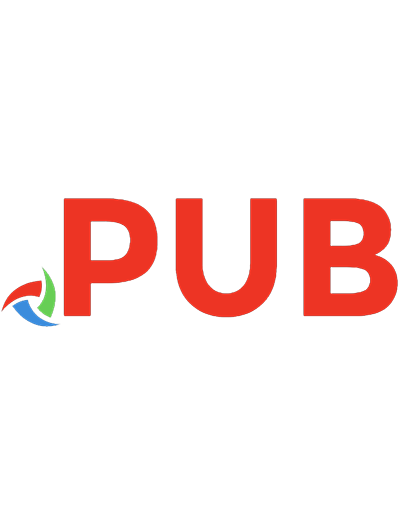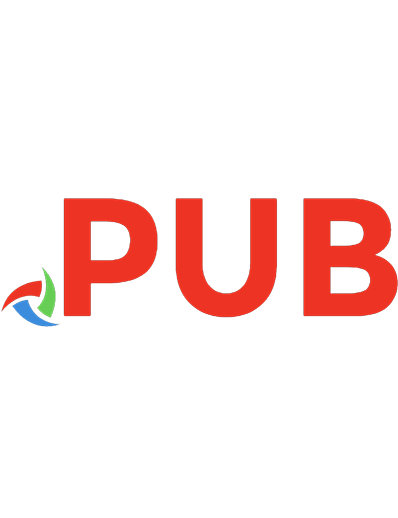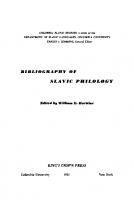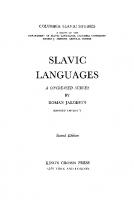A Dictionary of Slavic Word Families 9780231876926
A compilation of the vocabulary structure of the four major Slavic languages, Russian, Polish, Czech, and Serbo-Croatian
161 110 32MB
English Pages 668 [684] Year 2019
Polecaj historie
Table of contents :
Preface
Table of Prefixes
Table of Consonant Changes
Abbreviations
Part I.
Part II.
Part III.
Selected Bibliography
Citation preview
A Dictionary of Slavic Word Families
A Dictionary of Slavic Word Families
Compiled and edited by Louis Jay Herman
Columbia University Press New York and London
1975
L o u i s J a v H e r m a n is s e n i o r t r a n s l a t o r in t h e E n g l i s h - l a n g u a g e T r a n s l a t i o n S e r v i c e , U n i t e d Nations
Secretariat.
Library of Congress Cataloging in Publication Data H e r m a n , Louis J a v . A d i c t i o n a r y of S l a v i c word families. Russian, Polish, Czech, a n d S e r b o - C r o a t i a n entries a p p e a r i n g in that order in 4 parallel columns. 1. S l a v i c l a n g u a g e s — W o r d formation. 2. Slavicl a n g u a g e s — D i c t i o n a r i e s . 3. Dictionaries, Polyglot. I. T i t l e . PG305.H4 491.8 74-13341 ISBN 0 - 2 3 1 - 0 3 9 2 7 - 1
C o p y r i g h t © 1 9 7 5 C o l u m b i a University Press P r i n t e d in the U n i t e d States of A m e r i c a
A Dictionary of Slavic Word Families
Preface A characteristic of the Slavic languages which impresses ltBelf with particular forcefulness upon the English-speaking student is that they are, in the fullest sense of the term, vernacular tongues. Unlike English, which owing to historical circumstance has turned to foreign sources for most of its literary and specialized vocabulary, the Slavic languages have evolved from their basic store of native word-roots a vocabulary suited to all levels of discourse and capable of expressing abstractions and technical concepts in every field of human endeavor. This process of word-formation has, of course, been very largely a conscious one; many Slavic words are deliberate copies loan-translations or "caiques" of Latin, Greek or Gennan equivalents. Nevertheless, the result has been to endow the Slavic languages with a unity and coherence which English, with its successive overlays of French, Latin, Greek and other foreign words, does not have. Unless he is at least an amateur Latinist, the English speaker who uses an abstraction like the word coincide can make no associations between it and the concrete words of everyday speeoh; the meaning seems to have been assigned quite arbitrarily and must be accepted, as it were, on faith. To even a linguistically untrained and unobservant Russian, on the other hand, the equivalent word coBnaa¿Tb is immediately recognizable as a combination of three familiar words expressing the notion of "falling in together." In compiling the present dictionaiy, the author has sought to afford a broad view of the vocabulary structure of the four major Slavic languages, Russian, Polish, Czech and Serbo-Croatian, by assembling all the significant words derived from 200 of the more productive roots occurring in those languages. The work is addressed, in the first instance, to students of the Slavic languages who wish to enlarge their vocabulary in the language or languages with which they are familiar or to take up the study of another. At the same time, it is the author's hope that Slavic specialists, and perhaps students of other languages as well, will derive pleasure and profit from contemplation of the extraordinary richness and diversity of the vocabulary which has evolved from these relatively few, for the most part monosyllabic, roots. The basic scheme of the dictionary is a comparative one. The words in each root-group are set out in four parallel columns, the Russian, Polish, Czech and Serbo-Croatian entries appearing in that order. Words in the vari-
vii
ou8 languages which are morphologically identical, or virtually so, appear on the same line, regardless of meaning. (Under root ÜEPI Letc.j, for example, Rus. jtep«¿Ba "power Lsovereign state, country]," Pol. dzlerfeawa "lease," Cz. driava "domain, possession" and S-C drzava "state Lpolitical entity]" are entered on the same line, since all are formed from the root by means of the same suffix.) Thus, by looking down the column the reader can view the entire range of derivatives formed from the root in the given language, while by looking across the line he can note any semantic differences that have arisen in the various languages in words which are morphologically the same. The order of words in the column is, generally speaking, as follows: primary root-word, derivatives formed by suffixatlon, compounds formed by union with other roots, derivatives formed by prefixation. The semantic link between a given Slavic word and its root is sometimes so obvious as to require no explanation and at other times exceedingly tenuous and obscure. Since the meaning of a derivative formed purely by the addition of a suffix is generally not far removed from that of the root (see, for example, Cz. chodba "corridor; passageway," chodnik "pavement," chodldlo "sole of the foot" < root CHOD "to go, walk"), it has not seemed necessary to present and define the vast array of suffixes in the four languages in tabular fonn. On the other hand, since prefixation normally produces a clearly defined change in meaning, a table of prefixes, indicating the various functions which each performs in combining with roots, is appended to this preface. The semantic basis of compounds, which are listed under both component roots (unless, of course, one of the roots is not included in this dictionary), can usually be clarified by determining the other root from the index of root-forms (or, where necessary, the partial index of words) in the back of the book. The primary purpose of the notes accompanying each rootgroup is to solve those problems relating to individual words which cannot be solved by reference to the meaning of the root, the table of prefixes and the indexes. The notes also identify and define the second root in compounds whenever it is not among those included in this dictionary. Finally, both in order to clarify the semantic basis of the words to which they refer and in order to place the over-all process of Slavic word-formation in broader perspective, they call attention to comparable instances of word-formation in other languages. A further auxiliary feature is the table at the end of this preface showing the consonant changes evident in the various forms assumed by the roots in the four languages. Several principles have governed the selection of words for the dictionary. It was obviously neither possible nor desirable to include every word derived from a given root in the four languages. The fundamental aim has been, rather, to present all those words which are significant in themselves and/or illustrate a significant development in the meaning of the • root. Words composed of prefix root have, for example, been excluded if the meaning of the derivative reflects nothing more than the combined meanviii
ings of the two component parts (e.g. Rus. yB03HTb. Pol. uwozlc "to carry away" < Lu-] "away" ^ root B03 LWOi] "to carry"). In the case of related nouns, adjectives, adverbs and verbs which are differentiated only by their functions as parts of speech (e.g. Rus. aaOaBa "amusement," 3a6aBHhiP "amusing," aafiaBHO "amusingly," aaSaBJiaTb "to amuse"), an effort has been made to select the particular word which (1) most clearly illustrates the semantic use made of the root, (2) constitutes the primary derivative, and (3) is most frequently used. (Needless to say, it has not always been possible to realize all three of these desiderata. In many cases, the most graphic and least cumbersome method of presentation has seemed that of omitting a primary verbal derivative with a multiplicity of meanings e.g. S-C lzdatl "to publish; to betray; to spend; etc."
and illustrating its various meanings
through the nouns and adjectives formed from it: lzdan.le "edition; publication," lzdaja "treason, betrayal," lzdatak "expenditure," izdasan "abundant.") Both aspects of verbs are given (the perfective and imperfective forms appearing in that order) if the differentiation of aspect is achieved by lengthening or otherwise altering the stem; where the perfective is formed by means of a prefix, only the imperfective form is shown. (Perfective forms which lack a corresponding imperfective or are listed separately for technical reasons are denoted by an asterisk L*], while verbs which are both perfective and imperfective take a double asterisk L**j. In the case of imperfective verbs which have a durative and an Iterative form, the two appear in that order and are preceded by a dagger I 1 ], as are those iteratives which are listed separately. Alternate forms of verbs are given in parentheses. Notes introduced by the perfective or durative verb of a perfective-imperfective or durative-iterative combination can be taken to refer to both forms unless the context indicates otherwise.) The vocabulary presented is, of course, essentially that of contemporary Russian, Polish, Czech and SerboCroatian; words that have wholly passed from use have been excluded, regardless of interest. At the same time, a place has been given to those archaic words and meanings which, chiefly because of their occurrence in the literary classics, continue to appear in standard dictionaries and may be presumed to be familiar to the educated native speaker of the language. Dialectal and most purely colloquial words and meanings have been omitted. Like all principles and rules, those outlined in this paragraph are subject to occasional violation. Por the most part, such departures have been made in order to preserve the comparative feature of the dictionary; wherever a word in one language is listed for its intrinsic interest, its analogues in the other three languages are given as well for purposes of comparison, even though they may have no other claim to inclusion. The root-groups are arranged in Latin alphabetical order, although the vagaries of phonetic development in the four languages make a completely consistent scheme impossible and a particular group can therefore be located most readily by referring to the index of root-forms. References in the ix
notes are keyed to the first Russian root-form in the given group. Serbo-Croatian words are given in the Latin "¿agreb" orthography.
TABLE OP PREPIXES The table Indicates the various forms which the prefixes assume in the four languages together with their more readily identifiable meanings. It should be borne in mind that in many words the prefix has lost its original force or performs such purely grammatical functions as transforming nouns and adjectives into verbs, forming perfective and transitive verbs, etc. R 6e3, See
bez
bez
S-C be(z), bes
¿0
do
do, dfl
do
to, toward; up to; before, prior (to) ; often expresses striving; reaching, attainment; addition; completion
Z, 8
z
i(z)(a),
out, ex-, e-;
is
expresses exhaustion, deterioration; extraction, acquisition, obtaining on, onto; to; at, near; often expresses accumulation, amassing
H3(o),
HC
P
02
Ha
na
na, n a
na
M
nad
nad
na(d) , nat
without, -less
sometimes
over, above, super-, sur-; up to;
often expresses
superiority; (act of) exceeding, surpassing nle
He
ne
ne
not, un-, in-;
negative,
sometimes pejorative 06(0),
ob(e),
ob(e),
ob(a),
o6H.
obo, 0
0,
0£,
0
3
0
around, about; all over; expresses surrounding, covering; sometimes error, failure, adverse effect
OT ( 0 )
od(e),
£d(e),
o(d)(a),
ot
ot(e)
ot
off, away; back, re-; expresses separation; undoing; opening; rejection, refusal; negation; return; reply, response
x
R no, na
P £0, £§
Cz £0,
S-C £0, £B
£§
all oyer; along; after; (sometimes in S-C) back, re-; expresses covering; distribution; imitation; inferior quality; adverse effect; inception; limited duration
noA(o)
pod(e)
pod(e)
£o(d)(a), pot
under, sub-; toward; sometimes expresses substitution or falsification
npa
pra
pra
pra
proto-, first
pre
pre, pri.le
over, across, trans-; super-, sur-; athwart; through; over, again, re-; often expresses transition, transfer, transformation; extreme degree, intensity; superiority; (act of) exceeding, surpassing; Interruption, interference; alternation, reciprocity; error, failure
nepe, npe* prze
npejl*. npe.nn*
przed
pfed(e)
pre(d), pri.led. pret
before, in front; before, prior (to); fore-, pre-
npH
przy
pfl, pri
pri
to, toward; at, near; often expresses addition, attachment; adjustment; application (to); agreement, consent; incomplete, limited action
npo
pro, prze
pro, prfl
pro
through; by, past; forth, forward; before, prior (to); proto-, first; for (in some prepositional compounds); often expresses completion; thoroughness; loss; error, failure
npornB(o)
przeciw
proti
protiv(u), protu
against, anti-, contra-
*0f Church Slavic origin. xi
p
R
cz
pa3(o)•. roz(e) pac*, pQ3, poc
roz(e)
c(o), CJ_
zt.e),
s(e),
s (e), s,
^ , sou
s-c ra(z)(a), ras, ras
away, apart, in pieces; un-, dis-, di-;
expresses
separation, division; dissolution; undoing; spreading; distribution, arrangement; intensity a(a), z, su
with, together, co-, con-
sq, su 5(e), z(e)
_§
off, away; down
a, B u
u, u
u
off, away;
c(o)
5*
sometimes
expresses negation; distribution, arrangement B(O)
w(e), wq
v(e), u, u
Bb.
wjr
VI, Z Z
u, va*
in, into out, ex-, e-;
sometimes
expresses exhaustion, deterioration; extraction, acquisition, obtaining WZ, W8,
B3, BC, BQ3* , BOC*
WB, W8Z,
vz(e)
vaz**,
wez, wee
vas**
inception, emergence
3a
za
za
(in) back, behind, beyond;
za, za
uz, us,
up; upon; back, again, re-; sometimes expresses sudden
often expresses motion up to a certain point, within a certain range; halting, detaining; blocking, closing; replacement; inception; (sometimes in S-C) error, failure
*0f Church Slavic origin. **Of Church Slavic or Russian origin. xii
TABLE OP COHSONANT CHAHGES Polish
Russian 6 B R
b
Is sometimes lost before H
sometimes lost before n c alternates with cz ch " sz and _§ " d " " dz " dz
"
after 6 alternates with x and A
is sometimes lost before H & alternates with x and is normally lost before n M " sometimes " H
is sometimes lost between r and ft " before I > t before ch
3
alternates with » sometimes > C before T
K
alternates with V and IJ
C
is normally lost between C and H alternates with m
"
"
A
X
alternates with m
il
n
Il
e St
" v and a is normally lost between c and n " sometimes " " £ " £ n
> c before k k alternates with cz is sometimes lost between j and Ì n
II
g
If
n
r alternates with rz
T
11
C
£ alternates with 4
> 3 before CK alternates with JG CT
1B
a
n d BZ " sc, 66 and szcz t " C and C is normally lost between jj (j) and 1 (1) " "
"
M
"
v
w
" sometimes
"
between s (s) and n after b
z alternates with z and t i is normally lost before at zd alternates with zdz and tit Czech b is sometimes lost before n c alternates with c d " 2 is sometimes lost before _1 h alternates with z and z ch " I " 1 k " i " c r
"
1
"
1
S > z before d Bk alternates with jit *.
11
11
»
v is sometimes lost after b z alternates with z
xiii
•
Serbo-Croat ian b i s sometimes l o s t before n > j> before s M c > dz b ' c a l t e r n a t e s with jit d " " 4 i s sometimes l o s t between r and c or c " normally " before 1 or o ( _t before k £ a l t e r n a t e s with z and z i s normally l o s t before k > k before o o r e h a l t e r n a t e s with a and s k " " o " o i s normally l o s t between s and n ^ (when f i n a l in a word or s y l l a b l e ) often > o n > m before b s a l t e r n a t e s with s > z before b or d sk a l t e r n a t e s with j t t " " c and at i s normally l o s t between b and 2 n
n
it
n
g
" sometimes " " r " normally " " 5 " sometimes " before j j t v " " " after b z a l t e r n a t e s with z > s before k or t z > s " k " t
xiv
"
3
"
13
"
n
ABBREVIATIONS MLat.
adjective accusative active adverb anatomy anat. archaic arch. astronomy astr. attributive use attr. av. aviation b i o l . biology botany bot. initial capital cap. Ch. SI. Church Slavic chemistry chem. colloquial coll. commerce comm. conjunction conj. Czech Cz. Danish Dan. dative dat. dim. diminutive direct object dir. obj Dutch Du. economics eoon. elec. electricity English Eng. especially eap. Indicates all words et al. following the given word on the same line (etc.) indicates all other forms of the given root fem. feminine figurative use Finnish Pin. French Fr. gen. genitive geography geog. geol. geology Ger. German Goth. Gothic Gr. (ancient) Greek grammar gram. Heb. Hebrew hort. horticulture Hung. Hungarian Impere. impersonal construction Instrumental Inst. intr. intransitive It. Italian Lat. Latin linguistics ling. lit. chiefly literary usage Lith. Lithuanian locative loc. logic log. masc. masculine math. mathematics medicine med. military mil.
Medieval Latin music n. noun naut. nautical NLat. New Latin nom. nominative Hor. Norwegian 0 (before the name of a language) 01 obs. obsolete opp. opposite original(ly) orig. o.s. oneself part. participle pass. passive perf. perfective phil. philosophy phon. phonetics phot. photography phys. physics plural Pi. pol. politics Pol. Polish Port. Portuguese pred. predicate; predicative use prep. preposition; prepositional pres. present tense prob. probably pron. pronoun punc. punctuation reflexive refi. rei. religion Rum. Rumanian Rus. Russian Sansk Sanskrit sc. scilicet («following word understood) S-C Serbo-Croatian singular Bg. 8.0. someone Sp. Spanish s.th. something Sw. Swedish tech. technical tr. transitive ult. ultimately UBU. usually V. verb VLat. Vulgar Latin zool. zoology 1 first person third person 3 E equals becomes, develops into; > source of derived from < * (in the notes) hypothetical form * (in the word listings) See Prefac *• See Preface 1 See Preface
a.
acc. act. adv.
HUB.
xv
EJl, BOA, Eyjl, EYUL EJlE(fl)
BUD(Z)
B D , BED, BOD, B U Z , BOUZ
SABTk (arch.): to be awake SjiHTejibHbi»: vigilant SoAptiB: cheerful, spirited, lively COJPCTBOBaTb (lit.): to be awake
SvAHTb: to awaken (tr.); to arouse, stimulate
budzlc: to awaken (tr.); to arouse, stimulate
CyjAibHHK: alarmclock
budzikt alarmclock
BUD,
BD, BOD, BUB
BUD,
bditii to be awake; to see (to), attend (to) bdelyt vigilant
bd.jetlt to be awake ; to see (to), attend (to)
bodrrt genial, good-natured
bodart cheerful, spirited, lively
bedllvy: careful, thorough; mindful buditit to awaken (tr.); to arouse, stimulate
budik, budiceki alarm-clock ; (mil.) reveille
budltl: to awaken (tr.); to arouse, stimulate budan: awake; vigilant budllica. budllnIET-alarmclock budnicat (mil.) reveille
(lit.)r to keep (order) , observe (a law)
6JPCTH
[R]
CP]
[Cz] 1
[S-C]
BET HaOjuuiaTb:
to
observe, watch; (3a + Inst.) to supervise
noOVAMTb.
U0-
6vu&Tb:
to
Impel, prompt, Induce (mil.) reveille
•o6vi|Jia:
COOJMDCTH.
pobudzlé, pobudza£: to arouse, stimulate ; to impel, prompt, Induce
povzbudlti, povzbuzovatl: to encourage ; to promote, foster
pobuditl, pobudivati: to arouse, stimulate; to impel, prompt, induce pobuda: motive ; stimulus
vzbuditi, vzbouzetl (vzbuaovatl)» to awaken Ttr.: vzbuditi and vzbouzeti only); to arouse, stimulate
uzbudltl, uzbu&ivati: to excite
pobudka: motive; (mil.) reveille
CO-
CjcjiaTb: to keep (order), observe (a law)
BOSfiVAHTb.
B03-
OvuaTb: to arouse, stimulate; to excite; to incite; to raise (a question), present (a petition), institute (legal proceedings; [R]
wzbudzitf, wzbudzaé: to arouse, stimulate
[Cz]
LP]
LS-C]
NOTES Basle meaning of root: to be awake The Russian root-form EJTW is of Church Slavic origin. ejteTb et al.: The corresponding Polish word has not survived, bodrjf-bodar: (RUB. Cojtpu«. e.YAHTb et al.: the causative form of 6,neTb et al. 6 J I D C T H : The 1 sg. form is C J I P J Y .
EEr, EE*
^CemaTb,
BIE(G), BIEfc
CéraTb:
to run Per: run, running; race
CR]
*blec (blegngc), blegac5: to run bleg: run, running ; race; course (of time, events)
B&H, B1H, BEZ tbezeti, behatii to run beh: run, running; race; course (of time, events) LCz]
LP]
2
BIJEG, BJE(G), BJES bjezati: to flee bi,1eg: flight, escape
Ls-c]
BET CercTBO: flight. escape 6erjeu: fugitive
b.legunaos fugltive; refugee; deserter
6e*eneu: refugee
beienec: refugee bezirft current (a.); common, ordinary, usual
bieiqcy: current (a.) 6eraufl: fluent; cursory, superficial; brief, fleeting: fugitive (a.) fiery«: runner
biegiyi fluent ; skilful, expert
bihoun: trotter (horse); (carpet-, table-) runner
biegunt trotter (norse); rocker (of a chair, etc.); (phys., geog.) pole biegunka: diarrhea
iieHTPo6e*Huft: centrifugal knriobieg: circulation of the blood obleiyswiatt globetrotter rovnobezrtft parallel (a.) rflznobeinikt (math.) trapezoid sredob.leian: centrifugal svetobezniki globetrotter wspéîubiegaé aie: to compete izb.1egnuti (izb; e

![Dictionary of word origins [2d ed.]](https://dokumen.pub/img/200x200/dictionary-of-word-origins-2d-ed.jpg)








